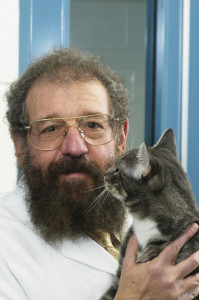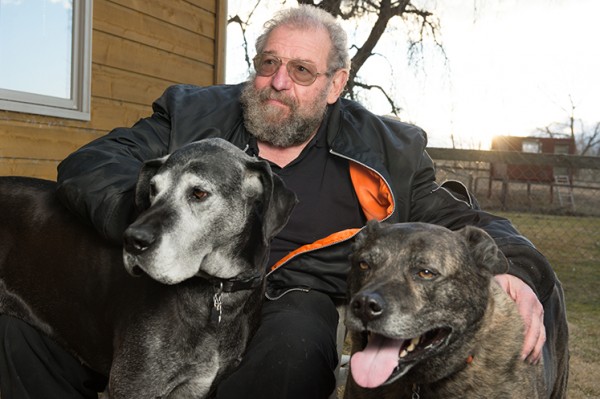As appearing in SOURCE.
He has a Great Dane named Molly and a stocky pit bull named King. His friends describe him as extremely intelligent and sometimes combative, though they also add that he’s kind, caring, honest, passionate and thoughtful.
These qualities and characteristics have helped make Bernard Rollin, Colorado State University Distinguished Professor, the scholar and bioethics expert that he is today. They’ve also placed him at the top of the list to receive career-defining awards.
Research ethics honors
Rollin was honored on April 1st in Bellevue, Wash., with a Lifetime Achievement Award for Excellence in Research Ethics from Public Responsibility in Medicine & Research, a nonprofit organization founded in 1974. PRIM&R has created professional standards and credentials for the research ethics realm and is active in public policy.

Rollin is the first award recipient recognized for animal care and use, and only the eighth person to receive the award since 2001. The award recognizes individuals who have made extraordinary contributions to the field of research ethics and, more specifically, honors people whose work has been seminal, exemplary and the embodiment of a commitment to advancing research ethics.
“I’ve lectured to about 25,000 cowboys,” Rollin said. “I get reports back: ‘I can’t stand the SOB, but he makes me think.’ The biggest compliment you can give a philosopher is to say they made you think, and they remember that stuff. That’s the proof for me, that it’s not just ass-kissing. So I’m blessed. I really am blessed. I get to fight for the things that can’t, and I get to fight against the things that can.”
He arrived at CSU in 1969 to teach philosophy and began teaching courses in medical ethics; this evolved into teaching ethics in veterinary medicine. Rollin began teaching a course in veterinary medical ethics in 1978; it is the first class of its kind at the university level, and the course has been a mandatory part of the curriculum since that time.
His title is Professor of Philosophy, Animal Sciences and Biomedical Sciences.
His wife, Linda — also an assistant professor in the Department of Philosophy — has been by his side for 50 years. She critiques everything that he writes.
Changing the mindset of being ‘for animals’
Lynne Kesel, D.V.M., took Rollin’s class in 1979. She said it was a joy to be in that course, since the professor encouraged debate and discussion. “Bernie is a vibrant teacher,” said Kesel, who completed her doctorate in veterinary medicine at CSU and now holds a leadership position in the university’s Research Integrity & Compliance Review Office.
“It was revolutionary,” she added, when talking about the ethics class. “It was a required class and people took it seriously. There were some naysayers, in essence, but a lot of them came around.”
Kesel said on the first day of class, a group of guys in baseball caps sat defiantly in the back row of the lecture hall. “They put their feet up on the desk,” she explained. “Bernie essentially challenged them and said, ‘Get your feet off the desk and pay attention or get out.’ They stomped their feet down and at least paid attention.”
The veterinarian — who, as an undergrad pursued a double major in English and art — said Rollin changed her way of thinking as a “pro-animal” person on things like cosmetic ear cropping and tail amputation.
He was also instrumental in changing they way doctors thought about pain control for animals undergoing surgery.
“Veterinarians didn’t routinely give pain control after surgery,” said Kesel. “One of the big things Bernie brought out in that class was sensitivity to pain control. He’ll say it’s one of the things that will keep him out of hell, the fact that now, virtually everyone is doing some kind of pain control.”

The changing landscape in pain control during this time is largely attributed to Rollin’s work and advocacy. “There were other people that got into the conversation, but Bernie was the loudest voice,” Kesel said. He and two CSU veterinarians, Harry Gorman and David H. Neil, were responsible for building pain control for laboratory animals into federal law.
While he’ll admit that he can be loud at times, he is also a dynamic and engaging speaker and lecturer.
In a recent class, “Values, Culture, and Food Animal Agriculture,” Rollin talked about dinosaurs and hunter-gatherers, asked students to describe the first domesticated animals and what they eat, which then led to a discussion about religion and what foods might be forbidden to eat in different cultures. He also discussed rural communities and dairy farming. “Historically, the nicer you are to the animals, the more they produce,” he said, driving a point home that went beyond dairy cows.
Rollin also described how he was among those who convinced Smithfield Foods — the world’s largest pork processor and hog producer — to phase out sow stalls, small metal crates used to confine pregnant pigs, which were often injured and suffered from major depression.
“This was a step in the right direction,” he told students. At the time, in January 2007, Rollin was quoted in the media along with the Humane Society of the United States and People for the Ethical Treatment of Animals.
Classroom style inspires thought-provoking discussions
Terry Engle, professor in the Department of Animal Sciences, team-teaches the values class with Rollin. They first met in a weight room on campus, in the early 1990s, when Engle was an undergraduate. They got to know each other better when Engle was pursuing a master’s degree at CSU and, subsequently, reconnected when Engle returned to campus after completing a Ph.D. at North Carolina State University.

The wide-ranging, no-holds-barred approach that Rollin uses in the classroom works because it’s not scripted, he said.
“It’s the discussion that makes the education,” Engle said. “We have a general outline of the topics we have to cover. But man, it really takes off. That’s the beauty of it. It allows for people to express what they’re feeling, but also, Bernie’s great at getting people to really think about an issue, more so than they ever have. You open up another level of discussion. The big issues are not black and white. They’re gray at best. That’s why I like teaching with Bernie.”
Engle and others said CSU students and the community are extremely fortunate to have this living legend on campus.
“We lucked out,” said Engle. “We’re very fortunate. I’m sure he could go wherever he wants. He loves CSU. He loves the students. We talk about this almost every time we finish one of our classes.”
Kesel agrees. “It has made our school absolutely stand out,” she said. “Bernie gives lectures at hundreds of venues. They don’t have anybody near the status of Bernie who is coordinating or teaching a class like the ones that we have.”
Rollin said he’s given 1,500 lectures around the world during his career. This includes providing animal welfare talks to nearly 40 veterinary medical schools and colleges in North America.
He is the author or co-author of hundreds of published papers — some co-authored with his son Michael, a Denver-based psychiatrist — and 20 books, including Animal Rights & Human Morality, The Experimental Animal in Biomedical Research: A Survey of Scientific and Ethical Issues for Investigators (co-authored with Kesel), Farm Animal Welfare: Social, Bioethical and Research Issues, An Introduction to Veterinary Medical Ethics: Theory and Cases, and Putting the Horse before Descartes: My Life’s Work on Behalf of Animals.
Learn more about Rollin and the award on the PRIM&R site.
